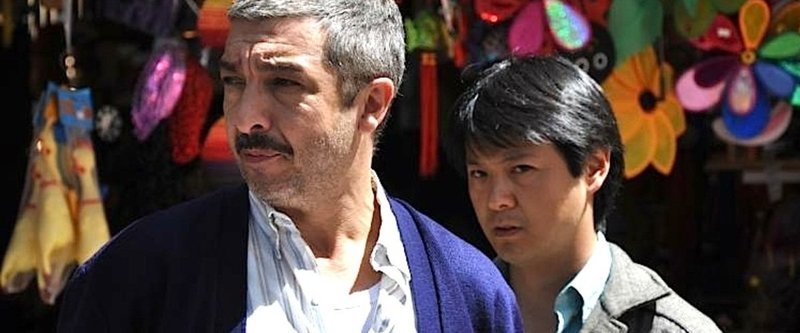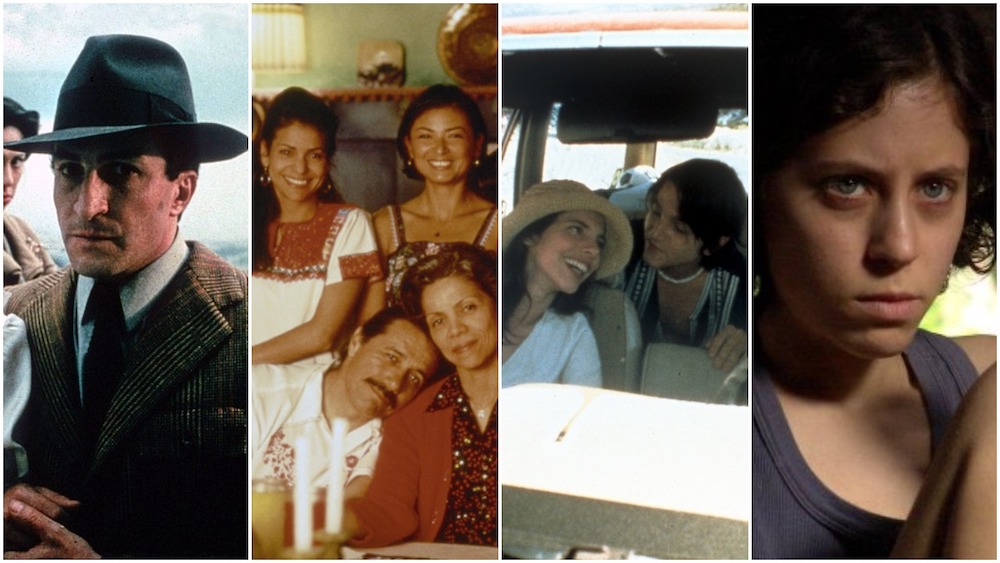As part of Hispanic Heritage Month, we’ve compiled excerpts from some of Roger Ebert’s reviews that previously celebrated the work of Hispanic/Latin filmmakers. A link at the end of each excerpt will take you to the full review.
“El Velador” – directed by Natalia Almada
With visual purity and simplicity, the film centers on the routine of the night watchman, or el velador, of a fast-growing cemetery favored by Mexico’s drug millionaires. It is the most fashionable address for the dead. During the day, the cemetery is a busy construction site, its laborers racing to keep up with the demand. At night, it becomes a ghostly necropolis. [link]
“Volver” – directed by Pedro Almodóvar
For Almodovar, too, “Volver” is like a homecoming. Whenever we are most at ease, we fall most easily and gracefully into our native idioms. Certainly as a young gay man in Franco’s Spain, he didn’t feel at home, but he felt displaced in a familiar way, and now he feels nostalgia for the women who accepted him as easily as if, well, he had been a ghost. [link]

“Chinese Take-Away” – directed by Sebastian Borensztein
“Chinese Take-Away” insinuates itself. To a degree unusual in most films, I became involved in the fates of these men, perhaps because they make no attempt to be likable. They are consistent with their natures, and the director tells the story with a clean, no-nonsense narrative. If there will be surprises, we can’t guess where they will possibly come from.
Many really good films allow us to empathize with other lives. I became invested in Roberto and shared his curiosity about the enigmatic Jun. I cared. The film deserved my care. Although one of its revelations is astonishing, it doesn’t come because of trickery but is consistent with information we already have. It is no easier for Roberto to process than it is for us. At the end, all we know for sure is that perhaps life is not entirely meaningless. [link]
“The Exterminating Angel” – directed by Luis Buñuel
Buñuel belongs to a group of great directors who obsessively reworked the themes that haunted them. There is little stylistically to link Ozu, Hitchcock, Herzog, Bergman, Fassbinder or Buñuel, except for this common thread: Some deep wound or hunger was imprinted on them early in life, and they worked all of their careers to heal or cherish it. Buñuel was born in 1900, so the dates of his films correspond to the years of his life. He had the most remarkable late flowering in movie history. His Mexican films of the 1940s and ’50s are often inspired–especially “Los Olvidados” (1950) and “The Criminal Life of Archibaldo de la Cruz” and “El” (both 1955). “Viridiana” was his international comeback, and then came “The Exterminating Angel,” which he said might be his last film–but the curtain was just rising on the great days of his career. [link]
“The Crime of Father Amaro” – directed by Carlos Carrera
“The Crime of Father Amaro” arrives surrounded by controversy. One of the most successful Mexican films in history, it has been denounced by William Donohue of the Catholic League for its “vicious” portrait of priests; on the other hand, Father Rafael Gonzalez, speaking for the Council of Mexican Bishops, calls it an “honest movie” and describes it as “a wake-up call for the church to review its procedure for selecting and training priests and being closer to the people.” Both sides treat the film as a statement about the church, when in fact it’s more of a melodrama, a film that doesn’t say priests are bad but observes that priests are human and some humans are bad. [link]

“Y Tu Mama Tambien” – directed by Alfonso Cuarón
Alfonso Cuarón is Mexican but his second and third features were big-budget American films. I thought “Great Expectations” (1998), with Ethan Hawke, Gwyneth Paltrow and Anne Bancroft, brought a freshness and visual excitement to the updated story. I liked “A Little Princess” (1995) even more. It is clear Cuaron is a gifted director, and here he does his best work to date. Why did he return to Mexico to make it? Because he has something to say about Mexico, obviously, and also because Jack Valenti and the MPAA have made it impossible for a movie like this to be produced in America. It is a perfect illustration of the need for a workable adult rating: too mature, thoughtful and frank for the R, but not in any sense pornographic. Why do serious film people not rise up in rage and tear down the rating system that infantilizes their work? The key performance is by Maribel Verdu as Luisa. She is the engine that drives every scene she’s in, as she teases, quizzes, analyzes and lectures the boys, as if impatient with the task of turning them into beings fit to associate with an adult woman. In a sense she fills the standard role of the sexy older woman, so familiar from countless Hollywood comedies, but her character is so much more than that–wiser, sexier, more complex, happier, sadder. It is true, as some critics have observed, that “Y Tu Mama” is one of those movies where “after that summer, nothing would ever be the same again.” Yes, but it redefines “nothing.” [link]
“Pan's Labyrinth” – directed by Guillermo del Toro
Guillermo del Toro (born 1964) is the most challenging of directors in the fantasy field because he invents from scratch, or adapts into his own vision. He has made six features since his debut at 29 with “Cronos” (1993), and I have admired, even loved, all of them, even those like “Hellboy,” “Mimic” and “Blade II” that did not receive the universal acclaim of “Cronos” and “The Devil’s Backbone” (a ghost story also set in Franco’s Spain). He is above all a visually-oriented director, and when he says “films are made of looks,” I think he is referring not only to the gazes of his actors but to his own. [link]
“Babel” – directed by Alejandro González Iñárritu
Iñárritu (born 1963) is one of three friends I have taken to calling the New Mexican Cinema, although other names should and will be included. Guillermo del Toro made “Pan’s Labyrinth,” and Alfonso Cuarón “Children of Men,” and with “Babel” those three titles are among the adornments of recent cinema. For unknown reasons a country (France, Sweden, Brazil, South Korea, Iran, Germany) will suddenly produce a brilliant generation, and that is happening right now in Mexico. That these Mexicans are also completely at home in English is our gain, but not their loss, because outside the United States most audiences are long accustomed to dubbing, even into their own languages. [link]
“El Topo” – directed by Alejandro Jodorowsky
“El Topo” is a picaresque journey past the principal myths and symbols of human culture, shot in the style of an incredibly bloody, violent Italian Western. People are going to it for all sorts of reasons. As a greasy, grimy, gore-dripping Western, it works just fine, and not even the early Clint Eastwood films had so much sweat and sadism. [link]

“My Family” – directed by Gregory Nava
Their story is the story of one Mexican-American family, but it is also in some ways the story of all families. Watching it, I was reminded of my own family’s legends and heroes and stray sheep, and the strong sense of home. “Another country?” young Jose says, when he is told where Los Angeles is. “What does that mean – `another country’?”
“American Me” – directed by Edward James Olmos
There is a scene late in “American Me” where a police squad car pulls up at a bus stop where a man and woman are standing. It is late at night. The couple have attended a wedding, and are in formal clothes. A cop gets out of the car, looks at the man, and asks him if he has done time in prison. Just like that. Is there a sad aura of some kind, that allows a cop to look at a man and know he has spent most of his life behind bars? “American Me” tells the story of the man at that bus stop.
“The Official Story” – directed by Luis Puenzo
Alicia is played in the movie by Norma Aleandro, whose performance won the best actress award at this year’s Cannes Film Festival. It is a performance that will be hard to forget, particularly since so much of it is internal. Some of the key moments in the film come as we watch Aleandro and realize what must be taking place inside her mind, and inside her conscience. Most political films play outside the countries that they are about; “The Official Story” is now actually playing in Argentina, where it must be almost unbearably painful for some of the members of its audiences. It was almost as painful for me. [link]

“XXY” – directed by Lucia Puenzo
Lucia Puenzo’s “XXY” is the first film that I’ve seen on the subject that is honest and sensitive — indeed, the only one. It is not a message picture, never lectures, contains partial nudity but avoids explicit images and grows into a poignant human drama. It will be described in terms of Alex’s sexual ambiguity, but that would simplify it, and this is not a simple film but a subtle and observant one. (“XXY” won the top prize in Critics’ Week at the 2007 Cannes Film Festival. [link]
“Silent Light” – directed by Carlos Reygadas
“Silent Light” has a beauty based on nature and the rhythms of the land. It opens with a sunrise and closes with a sunset, both in long-held shots, and we see corn being gathered by a harvester, wheat being stacked, long dusty roads between soy fields. The film’s cinematographer, Alexis Zabe, evokes some of the unadorned beauty of a film by Bresson, Bergman and of the Dreyer film this one in some ways resembles, “Ordet.” He keeps a distance that sometimes suggests awe. When Marianne comes to Johan at a critical time near the end, the camera sees them as distant figures across a field. It is not a time for closeups. [link]

“Deep Crimson” – directed by Arturo Ripstein
Ripstein, not well-known in America, is Mexico’s most respected director, and in “Deep Crimson” he creates the kind of dangerous film that Americans made more freely in the 1970s (when “The Honeymoon Killers” got reviews similar to “Crimson’s”). He is unafraid of offending his audience. He is going for hard truths, and approaching them through humor and a willingness to affront. His purpose is to undercut the way that movies glamorize legendary criminals like Coral and Nicolas. Anyone who thought “Bonnie and Clyde” romanticized its killers is likely to feel that the heroes of “Deep Crimson” get what they have coming, without mercy.
“El Mariachi” – directed by Robert Rodriguez
“El Mariachi,” an enormously entertaining movie, stands in danger of being upstaged by its budget, which was $7,000. Yes, $7,000, or about what it costs to cater lunch for a day on a Schwarzenegger picture. A movie’s budget, no matter how high or how low, is not a reason to go to see it. “Hudson Hawk” was bad even though it cost tens of millions, and “El Mariachi” is good even though it was made for what Hollywood considers walking-around money. [link]











